Chinese diplomat Ignatieff's gambit
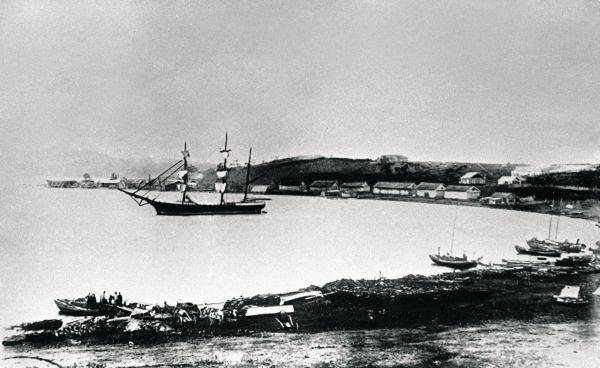
"Exceeded all our expectations ..."
No matter what anyone says, de facto Russia became 2 (14) November 1860 as a great maritime sea. On this day, in Beijing, an agreement was signed between it and the Chinese representatives, which secured the right of Russia’s sole ownership of the territories between Korea and the lower reaches of the Amur. Including the coastline and convenient harbors where the ports of Vladivostok, Vanino, Nakhodka, Vostochny, Posyet subsequently grew ...
The accession of Primorye is connected in stories with the person of the Governor-General of Eastern Siberia, Count N.N. Muravyev-Amur. But what he himself wrote to the then Foreign Minister of Russia, Prince A.M. Gorchakov:
"All doubts are dispelled, now we legally possess both the beautiful Ussuri region and the southern ports, and have acquired the right of land trade from Kyakhta, and the establishment of consulates in Urga and Kashgar. All this without spilling blood, by one, reducing, perseverance and self-sacrifice of our envoy, but The friendship with China is not only not broken, but it has been sealed more than before. Ignatiev surpassed all our expectations ... "
The envoy Nikolai Ignatiev is the main character of a little-known diplomatic war, brilliantly won by Russia.
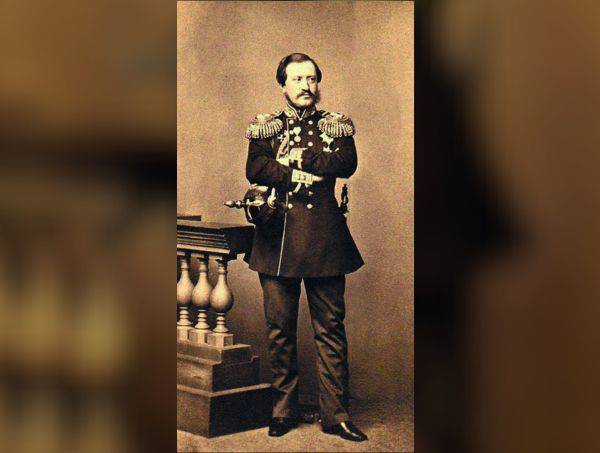
Nikolai Pavlovich Ignatiev Photos:
Tsar's godson
I met in Moscow with the biographer N.P. Ignatieva, V.M. Hevrolina. On her advice, I found several old documents, including two non-thin books published more than a century ago and have not been reprinted since. One was written by Ignatiev himself, the second, apparently, in his words. And within a few days, I literally swallowed almost 800 pages - a mixture of unique documents, a detective story and an adventure novel.
By the time of the Chinese business trip, Ignatieff had already signed the Aigun Treaty, according to which the left bank of the Lower Amur was recognized as Russian territory, and the right bank lands that we needed "in common possession." For signing the contract, the sovereign rewarded N.N. Muravyev title of Count of Amur. But, as it turned out soon, prematurely. The Chinese flatly refused to ratify the treaty, seeing in Russia a perfidious neighbor. Who could convince them?
Official documents do not explain how Gorchakov was guided, entrusting Ignatiev with the most complicated diplomatic intrigue. We can only speculate. And for this we need to get acquainted with our hero.
We'll have to start from afar, from December evening 13 December 1825, when the widow of artillery general Nikolai Ivanovich Ignatieva Nadezhda Egorovna had a serious conversation with her only son Pavel. And she took from her the word that he would be intelligent tomorrow. In the morning, the first company of the Preobrazhensky regiment commanded by Captain P.N. Ignatieva first came to the Palace Square under the banners of Emperor Nicholas the First.
After the suppression of the Decembrist uprising, the career of Pavel Ignatiev truly went uphill. He completed his life journey as chairman of the Committee of Ministers of the Russian Empire. And about his closeness to the royal family, it is already said that the eldest son and heir to the sovereign, the young grand duke Alexander Nikolaevich, became the godfather of his firstborn Nicholas.
Tsar's godson justified the expectations of his father: with honors, as the best 1849 graduate of the year, he graduated from the Corps of Pages, where comrades called him the Red Sun; with a silver medal out of the Nikolaev Military Academy; in the rank of colonel he went as a military agent (attache) to London; led the expedition to Khiva and Bukhara, concluding treaties with the emirs ...
The package with the order of Alexander II - to go on a mission to China - caught Ignatiev at the border. And the Order of St. Anne 2 degree and the Major General rank - in a few days in St. Petersburg.
Nikolai Pavlovich was the twenty-seventh year ...
11 months of negotiation torture
Together with Ignatiev, artillery captain Lev Balluzek (deputy and first assistant), experienced translator Alexander Tatarinov, inexperienced but arrogant secretary Wolf, translator from Mongolian Wambuev, five convoy Cossacks and faithful valet Mitya Skapkov left for Beijing. In mid-June 1857, they were at the walls of Beijing.
Under Ignatiev, there were experienced people who explained to him the importance of "Chinese ceremonies." Therefore, contrary to the advice of local officials, the envoy entered Beijing on a stretcher with a palanquin — a noble Russian nobleman was going! Ignatiev will continue to carefully study the Chinese traditions in order in the eyes of the Pekingans to correspond to high status. Soon, both in Beijing and beyond, the diplomat will respectfully call E-Dagen, that is, dignitary I.
Ignatiev placed his embassy in one of the two farmsteads of the Russian spiritual mission, through which all diplomatic ties between countries were carried out. And then he asked the Supreme Council of China to appoint negotiators. Those were the members of the Su-Shun and Rui-Chan Council. Their first proposal — to meet in the House of Talks, which was specially designed for diplomatic conversations — Ignatiev rejected: there the Chinese accepted representatives of vassal states.
Negotiations were held on the territory of the Russian Compound.
This, however, did not affect the position of the owners. At the first meeting, they categorically rejected all Russian proposals. And they said that the dignitaries who signed the Aigun Treaty did so without permission and were already punished by the emperor. Negotiations in Beijing were 11 months, during which Ignatiev more than once came to despair. One day, Su-Shun, in a rage, threw the Aigun Treaty on the floor with a shout that this piece of paper meant nothing. Tomorrow Ignatiev sent a complaint to the Supreme Council against the negotiator. This had an effect, and the Chinese dignitary didn’t allow himself such a thing. And the envoy in one of the reports even offered Gorchakov to land landing posts in the harbors of the Primorye Region, to set up posts without waiting for the ratification of the Aigun Treaty ...
By the way, this was a little later executed by Muravyov-Amursky, who ordered to send a hundred shooters and establish posts of Vladivostok and Novgorodsky.
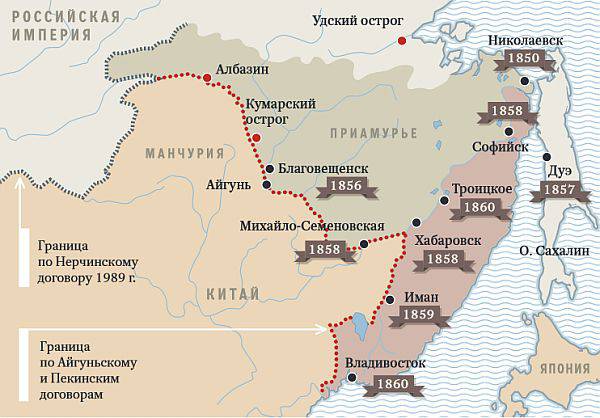
Escape from Beijing
MFA decided to change the negotiation tactics. Gorchakov advised Ignatiev at the first opportunity to join the warring allies, England and France, and with them go on a march to Beijing. And there to act as a mediator and peacemaker, demanding as a reward from China ratification of the Aigun Treaty.
To fulfill this plan, Ignatiev needed to go to the sea, where Russian ships awaited him. But the Chinese, shrewdly fearing a trick, refused to release a diplomat from Beijing. And then he decided to run. False rumors were spread in advance around the city, where and in what direction the escape would take place. Early in the morning of 16 in May of 1860, several carriages left the South Compound. After some time, two crews followed the embassy’s staff, and a messenger stretcher was taken out, covered by a palanquin. They were empty. Ignatiev, in military uniform, rode out of the yard on horseback and, unrecognized by anyone, set off after the advanced carts.
At the right moment, the wagons blocked the gate - the axes “broke down”, the guards rushed to them, and Ignatiev went out of the gate under the guise ...
In Shanghai, the Russian envoy met the top officials of the Allies. Among the British, it was the former governor of Canada, Lord Elgin, who dreamed of becoming the viceroy of India. The French have Baron Gros, a passionate traveler and photographer. Ignatiev sent official letters to both of them, where he ingenuously misrepresented: all questions between Russia and China are settled, he joins the expedition only as a peacemaker and volunteer. The allies met the unexpected companion with caution and even arrogant, which is not surprising, given the difference in age: Lord Elgin was 49 years old, and Baron Gros - 67! Well, Ignatiev tried to dispel their fears. He told about the Chinese - their traditions and habits ...
The allies appreciated his knowledge and manners - the young Russian diplomat was fluent in both English and French. And willy-nilly enjoyed his advice. Very insidious, I must admit ...
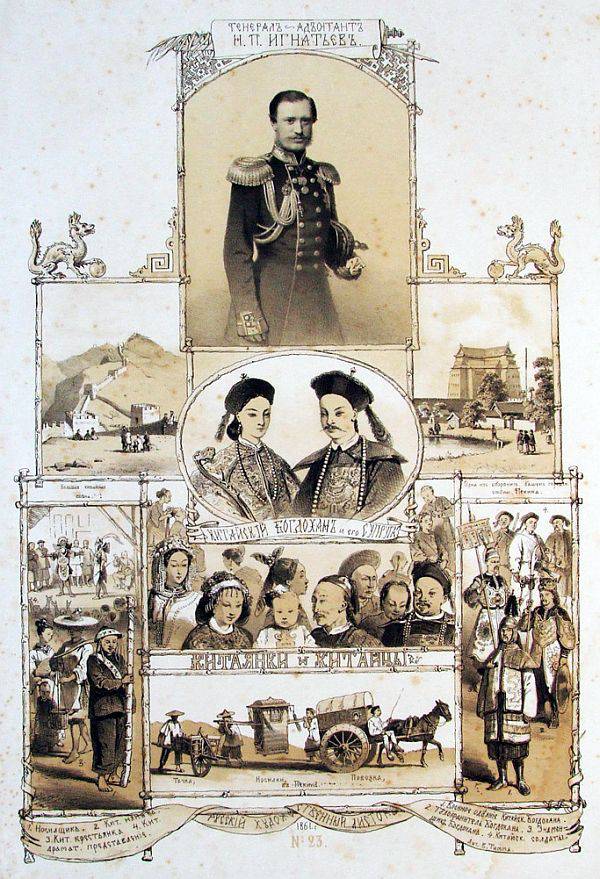
Hiking to Beijing
20-thousandth expeditionary force moved to Beijing. The Russian embassy did not keep up with him. Among the six Russian ships there was not one with shallow draft to enter the river. But there would be no happiness ... The laggard Ignatiev could now freely contact the Chinese without compromising himself. He observed the atrocities of the winners and ... from morning till evening he received Chinese complainants who went to him in search of protection. The young diplomat tried not to refuse anyone, incidentally complaining: that if the State Council had made an official request for help, the Russian tsar could well have stopped the war ...
The result of popular diplomacy Ignatieff was "word of mouth": if it were not for Beijing officials, I-Dazhen would have defended the Chinese, and powerful Russia banned Britain and France from fighting with China.
When Ignatiev finally reached Tianjin and caught up with the Allies, he offered Lord Elgin and Baron Gros his services in protecting local Christians from marauders. And, having received warm consent, I instructed my subordinates to issue white paper leaflets with the words "Christian" to all who applied for protection. These Chinese stitched leaves on the gates and doors. And soon there was no turning back from them: it was a rumor that the "Russian papers" protect against robberies ...
17 August Allied talks began with Tianjin's Supreme Council member Gui Liang. The Chinese dignitary accepted all the conditions imposed on him. But when, at the prompt, Ignatieff Gui-Liang was asked to present his credentials, there were none. Negotiations were upset.
The following were appointed in the town of Tongzhou, already near Beijing. A delegation of allies from 36 people (including a convoy) went there, followed by a London Times reporter Bowlby. Agreed on everything, including the presentation ceremony of the Commissioners to the Bogdykhan and the deadlines for the withdrawal of the allied forces ...
But then the star Ignatieff rose.
On the way back, the negotiators suddenly discovered that they had reached the rear of a huge Chinese army of about 60 thousands of people, including 8 thousands of Mongolian horsemen. English Colonel Walker was even more amazed that he went to meet the negotiators. Stopped in anticipation of further orders and the vanguard of the French, suddenly stumbled upon the right wing of the Chinese army.
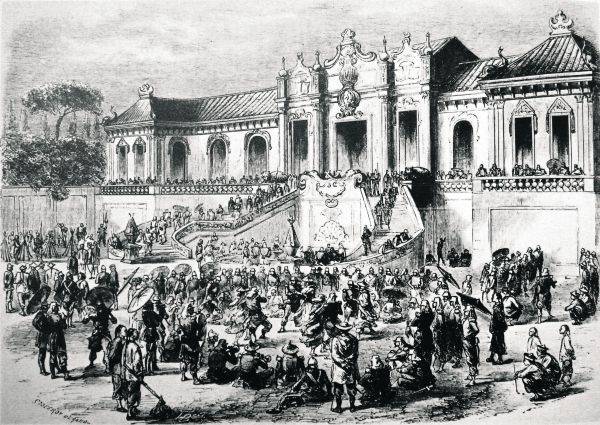
And then the firing began!
It later turned out that the French quartermaster officer liked the Mongolian rider's muleback. And he tried to select this hinny. A fight ensued, witnessed by Colonel Walker. A few more horsemen arrived at the Mongol’s help. Walker, exposing his sword, jumped to the rescue of the Frenchman. The saber was taken from him, and she also cut her head to Walker. And when he, with a bloody head, galloped along the Chinese fortifications, several shots rang out through him - first from guns, and then from guns. Assuming the worst, the commander of the French vanguard ordered the attack and crushed the right wing of the Chinese army. The approaching British hit the front ...
The Chinese army was defeated in a few hours, but ... the parliamentarians remained in the hands of the Chinese! Some of them are executed immediately, some are tortured to death, including the reporter Bowlby ... Only 13 people will end up alive as a result.
And help to return them Ignatiev.
That's when he will be needed by both warring parties.
Chinese ceremonies
The Allies rushed to Beijing like a herd of angry bulls. Having stumbled upon the summer residence of the Bogdykhan, the Yuanmingyuan Palace, they looted it and burned it. Bogdykhan fled from Beijing.
Ignatiev himself at that time literally tossed between Elgin and Gro, trying to stop the offensive. “If the Qing Dynasty falls, with whom will the Allies sign a treaty? Who will pay them a contribution? Instead, they will have to create a new power in China, bear new expenses!” Under the walls of Beijing, the Allies did stop. But they demanded the transfer of control over the city gates. What was performed.
And the first to enter Beijing was, of course, Ignatiev! This was done in the best traditions of Chinese ceremonies - see who is in charge here. Vain Elgin was extremely annoyed to learn about it. Well, I-Dazhen, who arrived at the Russian Compound, was immediately visited by the Chinese delegation. Looking ahead, I will say that the next day after the signing of the treaty with the allies, Ignatiev was also visited by the younger brother of Bogdyhan, Prince Gong Qing Wang; in the absence of the emperor, he led all official affairs. He and Ignatiev were almost the same age. And they managed to quickly agree.
Ignatiev's conditions: Gun must apply to him with a formal written request for mediation; the Chinese government does not hide its contacts with the Europeans from it and does nothing without prior advice from the Russian envoy; Gun recognizes and approves the Aigun Treaty and agrees to the delimitation of the Ussuri River to Korea.
The Chinese, in turn, asked Ignatiev to soften the claims of the Europeans, who demanded immediate payment for the dead, punishment of the guilty, destruction before the founding of the Summer Palace ... Ignatiev promised assistance in nine points from 10. And he guaranteed Prince Kung full security when signing all contracts. All his promises Nikolai Pavlovich later fulfilled.
12 and 13 in October 1860 of the Year in Beijing by Prince Goon and each of the Commissioners signed the treatises. First by the British, the next day - by the French. It was the turn of the treaty of China with Russia, which was prepared in secret from the allies ...
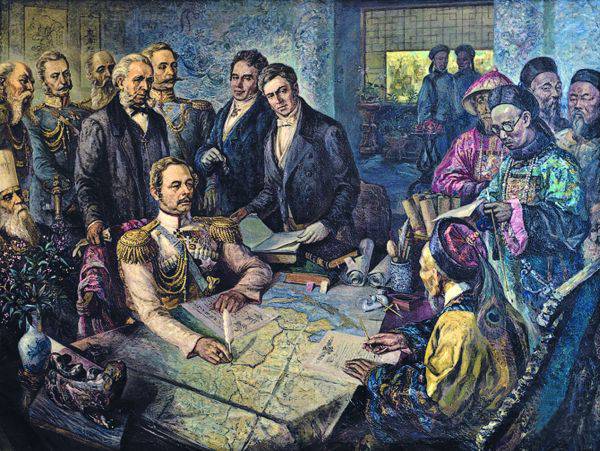
Diplomat triumph
So that the allies would not prevent the signing, Ignatiev managed to convince Elgin and Gro to place his embassies in Tianjin until spring, under the protection of the allied forces, where it was warmer and more satisfying. And at parting he made a reception in Beijing. Diplomats and generals drank to win, thanked the host for help. And in the next room, the assistants of Ignatieff at the same time heatedly argued with the Chinese representatives about the text of the joint agreement - negotiations were held daily on 6-7 hours. From time to time Ignatiev went out to "air out", listened to the reports of assistants, made adjustments and returned to the guests. In the discussion of the text, he participated only through intermediaries, although he wrote it, of course, himself.
October 28 European Commissioners left Beijing. And on October 31, Prince Gong sent a letter with the decree of the Bogdykhan decree stating that he had read the text of the treaty with Russia, agreed with him and orders the contract to be signed.
The final treatise had 15 articles. The first, in confirmation of the Aigun and Tyantszinsky Treaties, approved a new frontier line from the mouth of the Ussuri to the Tu-mein-jiang river on the border with Korea. Articles from 4 to 8 described new, equally free trade relations between states. Subsequent articles identified issues of diplomatic relations. A little later, in the spring of 1861, a delineation map was agreed.
The solemn ceremony of signing the Beijing Treaty took place in the Russian Compound 2 in November at half past four in the afternoon. Gun gave Ignatiev the right to first put his signature. Two copies were signed in Russian and two in Chinese and exchanged. After the ceremony - champagne, sweets and tea.
And on November 10 on the first snow Ignatiev left Beijing ...
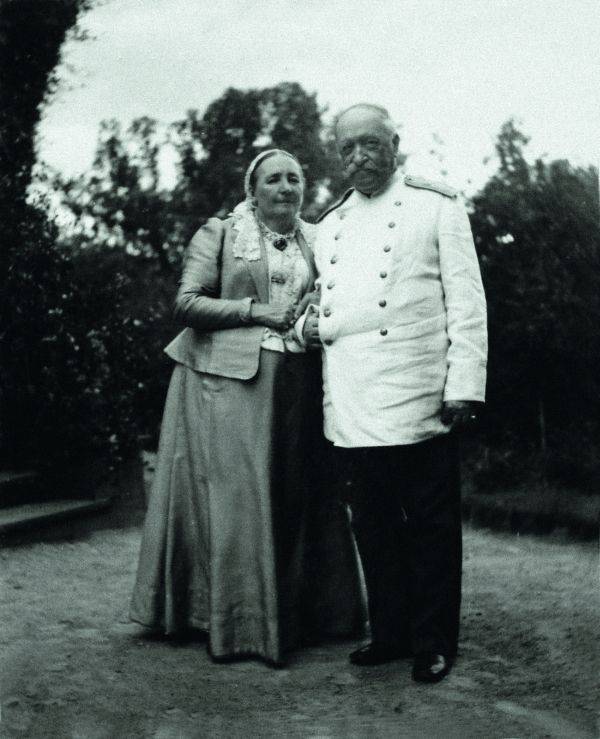
Sunset
The sovereign noted his work in China with three orders, the rank of adjutant general and the post of director of the Asian department of the Ministry of Foreign Affairs. Ignatiev will never return to China. Six months later, he suddenly and happily marries a young beautiful princess Ekaterina Golitsyna. Two years later, tired of office work, he will leave as ambassador to Constantinople, where he will earn the nickname of "vice sultan." He will participate in the Russian-Turkish war, in 1878 he will sign the San Stefano peace treaty and will become the national hero of Bulgaria ...
Under Alexander III, he will serve as Minister of the Interior. Do not work together. Sunset, ruin, demise in the estate near Kiev in 1908 year ...
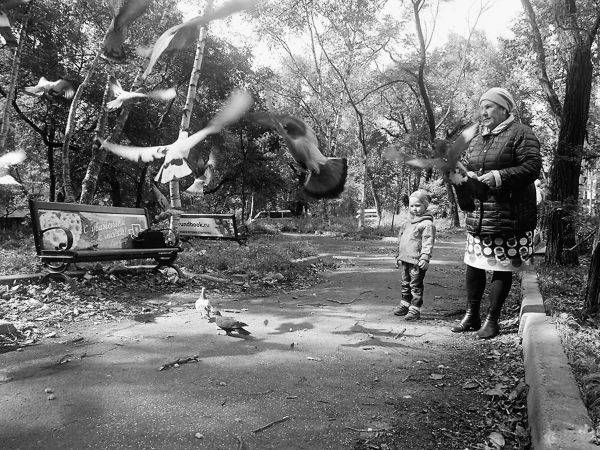
Information